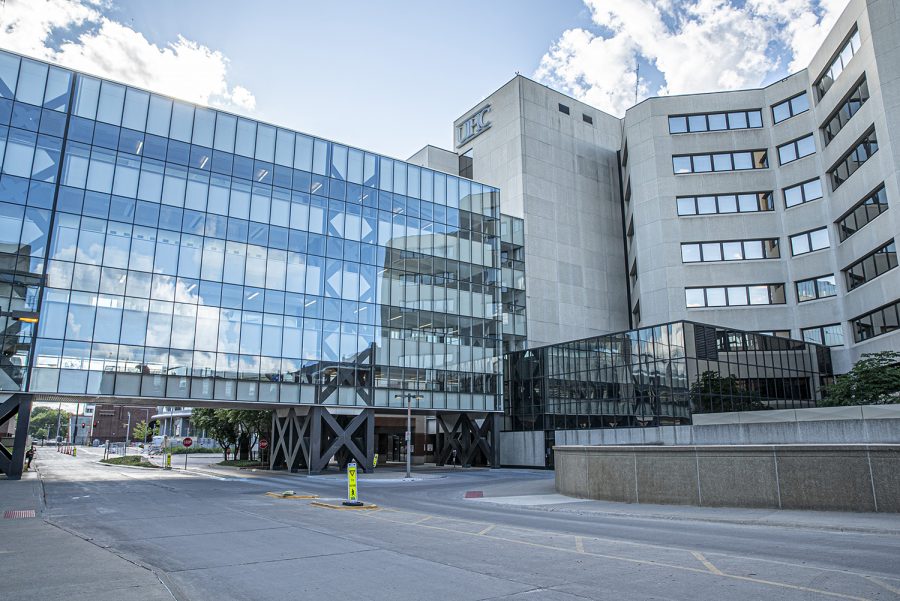COVID-19 disrupted progress toward ending cancer disparities, UI experts say
The University of Iowa Hospitals and Clinics Holden Comprehensive Cancer Center has seen a drop-off in cancer screenings because of the pandemic’s impact on the hospital.
University of Iowa Hospitals and Clinics are seen on Tuesday, June 23, 2020.
November 2, 2021
The COVID-19 pandemic disrupted progress toward ending cancer disparities, experts at the University of Iowa Hospitals and Clinics say, leading to fewer opportunities for new research and clinical developments for patients.
Although there have been encouraging signs of narrowing disparities in recent decades, including declining cancer incidence and mortality rates among underserved population groups, the pandemic has furthered disparities, according to the American Association for Cancer Research.
“These cancer disparities result from differences in social determinants of health, and these inequalities were further exacerbated by the pandemic,” said George Weiner, director of the UI Holden Comprehensive Cancer Center. “In Iowa, we saw screenings drop during the pandemic and expected this would disproportionately impact underserved populations that have greater health care access issues.”
The pandemic resulted in a drop-off in screenings for cancer, including mammograms, which are essential for determining whether someone has breast cancer, Weiner said.
The cancer center didn’t see a decrease in care, however, he said. Instead, there were more patient volunteers in cancer treatments, he said.
“With most cancers, the earlier you find it means it’s easier to treat,” Weiner said. “Cancer screenings are important, and they were much higher before the pandemic.”
Additionally, fewer patients coming into the hospital impacted cancer research, said Gail Bishop, UI Carver College of Medicine professor of microbiology and immunology.
“Delayed research has a cascading effect where new therapies and diagnostic procedures that would be working their way to patients are now delayed,” Bishop said. “Advances in cancer care and treatment of survivors were also impacted.”
Although the pandemic has been difficult on cancer care and research, Weiner said his team has learned some valuable lessons, including doing clinical research using telemedicine and other virtual tools. Patients are also encouraged to get their blood work done at hospitals closer to home, he said.
Weiner said another positive impact of the pandemic on cancer research is that people understand what clinical research and trials are because of the news surrounding COVID-19 developments.
RELATED: UI continues research analyzing brains of young cancer patients
People recognize that advances in one field can help in another, Weiner said, as the cancer research that helped lead to the development of the COVID-19 mRNA vaccines shows. According to the National Center for Biotechnology Information, vaccines that use mRNA technology can fight against infectious diseases and several types of cancers. This result led to the development of the Pfizer-BioNTech and Moderna vaccines, he said.
Mary Charlton, UI associate professor in the department of epidemiology, said COVID-19 is at the top of people’s minds, so they aren’t worried about cancer screenings.
“Cancer screenings help detect cancer before you’re symptomatic,” Charlton said. “They are the most effective tool we have to find cancer before you’re feeling sick.”
If people wait until they have symptoms to get screened, the cancer may have progressed to a point where it’s harder to treat, she said.
Charlton said early treatment is especially crucial in cervical, breast, colorectal, and lung cancers. Finding the cancer earlier allows patients to forego chemotherapy or extensive radiation, which can be toxic and harmful to the body, she said.
In the case of lung cancer, Charlton said, not detecting it early enough can be deadly.
According to the American Association for Cancer Research, identifying the underlying causes of the rising incidence in certain early-onset cancers is critical for continued progress against cancer.
In the U.S., the overall age-adjusted cancer death rates have decreased by 31 percent from 1991 to 2018 — a reduction that translates into 3.2 million cancer deaths avoided, according to the American Association for Cancer Research. This decline is driven in large part by dramatic reductions in lung cancer, the screenings for which have experienced a drop-off, Charlton said.
The most important way to keep these numbers low is to continue to receive cancer screenings and treatments, Weiner said.
Additionally, people who may be at risk for cancer because of genetics or lifestyle choices should seek out genetic counseling, Charlton said. This is one of the most important ways to talk through potential cancer diagnoses, she said.
With the pandemic, people have experienced lifestyle changes that may have an effect on cancer, Charlton said.
“We are researching how people’s smoking and drinking habits changed as a result of the pandemic,” she said. “We don’t know if these are permanent or temporary changes, but people have experienced changes in their diet, exercise, and other things that can lead to cancer.”














